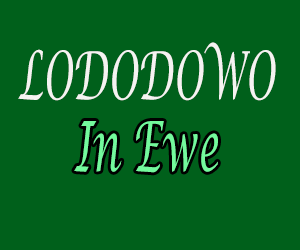The elderly mostly speak in words known as parables or proverbs which in the Ewe language are called LODODOWO. It is a term that refers to statements, sayings, and expressions whose meaning differs from the literal meaning or translation of the statements. At times, the use of these shows how mature a person is in the knowledge of his or her cultural background. Scholars of the Ewe Language refer to the language as one of the most difficult languages to study considering its composition.
- Afia ɖe kpɔkpɔ nyo wu yame kpɔkpɔ
Literal translation: Looking at somewhere is better than looking into the air.
Meaning:It has to do with many circumstances of life. One of these is that if a person finds something to do, it is better than being idle. Apparently, everyone abhors lazy individuals, and for this reason hard work is pushed to the core because it is the only way to build a healthy, wealthy society. A proverb like this is applicable in many life situations and the use depends on a person's understanding of it and how well it fits a situation.
- Kokloxɔvuvu mekpea nu na koklo o
Literal translation: A fowl is not ashamed of its dilapidated pen.
Meaning: Individuals at certain stages of life get to feel ashamed of their identity and even fall into an inferiority complex. This issue of some negros trying to bleach because from their view, their color is not what they might have preferred meanwhile God makes every human fearfully and wonderfully according to his purpose and will. In advising young ones like the youth, the elderly use a wise saying like this to caution the upcoming ones not to look down on where they come from nor feel ashamed of how others think about it but rather must cherish it and deem it the best place to belong to. In fact, this is the attitude considered potent in building a nation.
- Ame manɔsitɔ, Mawue nyaa tagbatsutsu n3.
Literal translation: God is the one who drives away houseflies for a disabled person.
Meaning: Matthew 6:26 [Look at the birds of the air: they neither sow nor reap nor gather into barns, and yet your heavenly Father feeds them. Are you not of more value than they?]
God is the Omnipotent and Omnipresent one who has dominion over everything and so far as a person trusts in Him, He remains faithful. This is why such a saying comes as an encouragement to whoever is in any unfortunate situation because God never sleeps or slumbers. The wisdom of the men who initiated a saying like this is something to think very deep about because a housefly truly disturbs you when for instance you have a wound or a scar. For someone with every body part functioning, he is able to drive them away. What about he who is disabled? The saying in reality has a lot to teach and inspire.
Literal translation: A mouse is in the thatch.
Meaning: A little history of how this statements has to do with how in the olden days. houses were built with mud and clay and then roofed with thatch. Mice are able to hide in the thatch and come down to feed on any food material found inside the room.
Supposing elderly people are discussing a matter of secrecy while there is a child or someone who can't keep secrets around, this statement is used to alert the person in charge of the conversation that there is a talkative around. A talkative in this case is someone around who might hear the conversation and disclose it thereby spreading what is supposed to be a secret. The next action after a statement like this is made is that the dialogue is switched into a tone that only those conversating can relate.
Literal translation: He or she has not eaten salt.Meaning: It means that a foreigner is around who does not understand the language.
Literal translation: A person has put his or her leg in a bottle. Meaning: It is to say that a person has passed away.
Literal translation: She has eaten gari.Meaning: A nice way of saying a person is pregnant.
- Afɔ mevɔ na le aɖiba vivi tsi te o.
Literal translation: Footprints never get finished under a sweet pawpaw tree.Meaning: For someone who does good to others, there exists that tendency that people will always love to associate and engage with such a person.
Literal translation: A lizard has climbed a tree.Meaning: A person is hungry.
Literal translation: He or she is tying one tuber of yam. Meaning: It is to say that a person is mad or going crazy. Ideally tubers of yam are tied together for easy carrying but when it happens that a person is tying a single tuber of yam, then it is an indication that something is going wrong.
- Foɖi kelia, za gbɔ metsɔ o.
Literal translation; To dirty the day, the night is long.Meaning: A funny statement to make. Someone can eat during the day and as he or she is well satisfied says no eating before sleeping. The truth is that the night can be long when one sleeps hungry.
- Tsatsala kpɔa nu wu dzidela.
Literal translation: A person who roams sees more than he who climbs up a tall tree:Meaning: Travel and see is a very powerful statement. He who has traveled the length and breadth of countries has definitely seen more than he who has not.
- Akpa medzia vi woɖia adehe oo.
Literal translation: A tilapia does not produce offspring that resemble catfish.Meaning: This can also mean that whatever a person sows, that is what he or she will reap. In reality, trying to break down the statement, the character and some other traits of parents become inherent to the children born.
- Amee nɔa ame nu wonyea za mi
Literal translation: Someone must accompany you when going to nature's call in the night.
- Amenuvela meɖoa yɔ kple ame o
Literal translation: Some offering to help will not enter the grave with the one he is helping.
- Ka xoxoa wonu wogbia yeyea wo ɖo
Literal translation: The new ropes are made according to the old ones.
- Dzakpata be ɖevi menya ku o
Literal translation:
- Egbɔ nye mitsi be yele kpɔ do me gble maa, ye nutɔ Ꞙe meꞘi mee gblem wòle
Literal translation: A goat that has a running stomach defecating in the neighborhood thinking it is polluting the environment is polluting its own anus.
- Ame nutɔ Ꞙe akple koe wò yɔ na be akple kɔ
Literal translation: A person calls his own small ball of akple a big ball of akple.
- Ɖevi ka akple ga meka nya ga o
Literal translation: A child that eats big balls of akple cannot speak big words.
- Agbate kɔla mefa kɔ fe avi o
Literal translation: A person whose work is to carry loads on the head does not complain of neck pain.
- Agbenɔ xevi megbe fu mato o
Literal translation:
Literal translation: A young cat can only catch a young mouse.
- Fetri tsi mekoa wu agbletɔ o
Literal translation: An okro plant does not grow taller than the farmer.
- Ame metsɔ emia si fia ède dume o
Literal translation: A person does not use the left hand to show his hometown.
- Ame de amenu menyea ηɔ woko na o
Literal translation: Someone who is lord over you cannot flatulate and you laugh.
Literal translation: A dog that breaks bones cannot break a metal.
- Gbɔ be lidolae wo xɔna na
Literal translation: A goat says that one who shouts is the one that gets help.
- Dzi Ꞙe ɖoɖo menye dzi Ꞙe dzadza o
Literal translation: A cloud formation does not guarantee the falling of a rain.
- Kpo si le ame si Ꞙe dae woꞘona
Literal translation: The kind of stick in a person's possession determines the type of snake he can kill with it.
Literal translation:
- To mekpɔa vese Ꞙe dzodzo be yeadzo o
Literal translation:
- Ɖevi gba abɔbɔgo megbaa klogo o
Literal translation: A child that cracks a snail's shell cannot crack the shell of a tortoise.
Literal translation: The stick used to lead a cattle cannot kill the cattle.
- Za medo woabufɔ ahakpala o
Literal translation:
Literal translation: A tree stump in the river cannot turn to a crocodile.
Meaning: A person is hungry.
Egbe kpaa nyemefe likui o
Meaning: I have not eaten today
Meaning: Night has come
Meaning::Thief
Meaning: Liar
Meaning: Lazy woman
Meaning: To deceive someone
Meaning: Eat breakfast
Meaning: Run away
Meaning: Hurry up
Anyitsi wònye kɔ ɖe dzowoe dzi
Meaning: Something very pleasant
Meaning: Has given birth twice











Comments
Post a Comment
Share your views on this insightful content